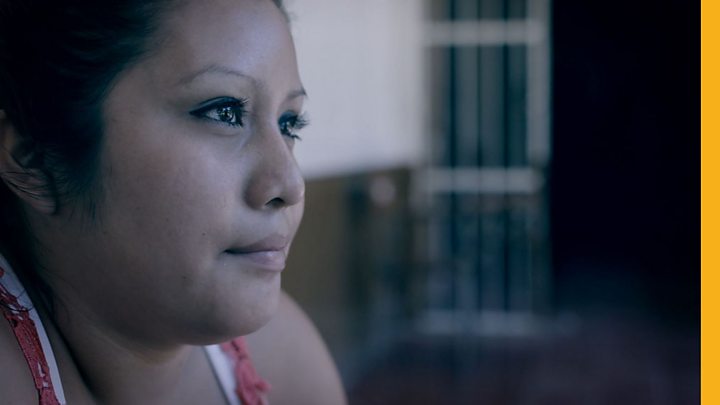 Image copyright
Reuters
Image copyright
Reuters
A woman in El Salvador has pleaded not guilty at her retrial to charges of aggravated homicide after she gave birth to a stillborn baby in a toilet.
Evelyn Beatríz Hernández Cruz, 21, had served nearly three years of a 30-year sentence when she was released in February.
Following an appeal, a court ordered she be retried, but granted she could live at home during the process.
She has maintained that she did not know she was pregnant and is innocent.
However, prosecutors claim she is guilty because she did not seek maternity care.
"Thank God I'm fine, I'm innocent... I trust God and my lawyers a lot," Ms Hernández told the Efe news agency outside court.
Dozens of supporters held a protest outside the court near the capital, San Salvador, calling for a change in the legislation.
This is the first retrial of an abortion case in El Salvador.
The country outlaws abortion in all circumstances, and dozens of women have been imprisoned for the deaths of their foetuses in cases where they said they had suffered miscarriages or stillbirths.
There are hopes among human rights groups that the new government of President Nayib Bukele, who took office in June, could usher in a more lenient stance on the issue.
The case so far
In April 2016, Ms Hernández gave birth at home in a rural area of the Central American country. She lost consciousness after losing large amounts of blood.
Her mother told the BBC that police arrived at a hospital while her daughter was receiving treatment.
Although she was in the third trimester, Ms Hernández insisted she would have sought medical treatment had she known she was pregnant.
In her first trial, she told the court she had been repeatedly raped. Her lawyers said she was too frightened to report the rapes, and some reports said the man who raped her was a gang member.

Medical experts could not ascertain whether the foetus had died in her womb or just after being born.
Ms Hernández said she had confused the symptoms of pregnancy with stomach ache because she had experienced intermittent bleeding, which she thought was her menstrual period.
However, the judge decided Ms Hernández knew she was pregnant.
After almost three years, in February she was granted a re-trial with a new judge.
Rights organisations in El Salvador says there are still at least twenty other women in jail under the country's strict abortion laws. In the last decade, campaigners have managed to free around 30 through evidence reviews and retrials.